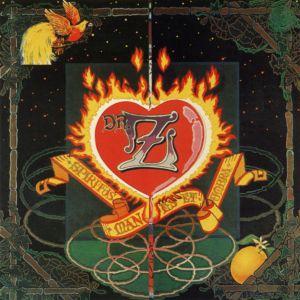
- Format: MP3

Japan 24-Bit Remaster
One of the great, lost prog rock albums, Dr. Z's “Three Parts to My Soul” ended up being one of the rarest albums on the "swirl" Vertigo label, with only 80 copies said to exist. Luckily it was reissued many times, starting with Second Battle in Germany, Si- Wan in Korea, Universal in Japan, and most recently Akarma in Italy. Most of these reissues replicate the original gimmick cover (a die-cut fold-out cover not unlike ELP's “Brain Salad Surgery”).
Dr. Z was lead by North Wales university professor Keith Keyes, who handles keyboards (harpsichord, piano, organ), as well as vocals, with Bob Watkins on drums, and Rob Watson on bass. This is another album, like BLACK WIDOW's “Sacrifice”, that featured lyrics that flirted with the occult in a prog rock setting. Here Keyes had the idea that in the afterlife, your soul is divided in to three parts, with a Latin term to each, Spiritus, Manes et Umbra. Spiritus was the soul that goes to heaven, Manes is the soul that's damned to Hell, and Umbra being the soul that stays on Earth to eternally haunt. There are some people who don't think this album is particularly good. OK, so don't expect polished YES/GENESIS-influenced prog here. What you get is early British prog, dominated mainly by harpsichord, with occult lyrics and very peculiar vocals, trying to sound "evil". The production isn't the greatest in the world, although it was produced by Patrick Campbell-Lyons of NIRVANA (the late '60s/early '70s UK band that is, hardly the Kurt Cobain-led grunge band everyone knows of).
"Evil Woman's Manly Child" is said to be a reverse of the Ten Commandments. Here you get two voices, a whispered voice and a sung voice. This is truly one of the album's many high points. "Spiritus, Manes et Umbra" could almost sound like a hit if things worked out a bit different for the band (and of course, rid of the drum solo). It's such a catchy little song. "Summer For the Rose" shows some psychedelic elements, showing how in 1971, the 1960s hadn't totally vanished. "Burn in Anger" is a piano-dominated ballad that truly screams 1971, while "Too Well Satisfied" is one of those cheesy songs with lots of appeal. "In a Token of Despair" is the closing ballad, regarding the spirit that haunts the Earth. The entire album has that theatrical quality. Many of the reissues come with two bonus cuts, "Lady Ladybird" and "People in the Street", which was released as a single back in 1970 on Fontana. What's really interesting about these two cuts, written by Keith Keyes as on “Three Parts to My Soul”, is you will find absolutely no signs of occult subject matters in these two songs. "Lady Ladybird" is a pretty cheery number. "People in the Street" on the other hand sounds too much like straight-up pop, lacking the charm of "Lady Ladybird". But for “Three Parts to My Soul”, this might not to be everyone's taste, but I like the album, regardless what might be said.(Review by proghead0)